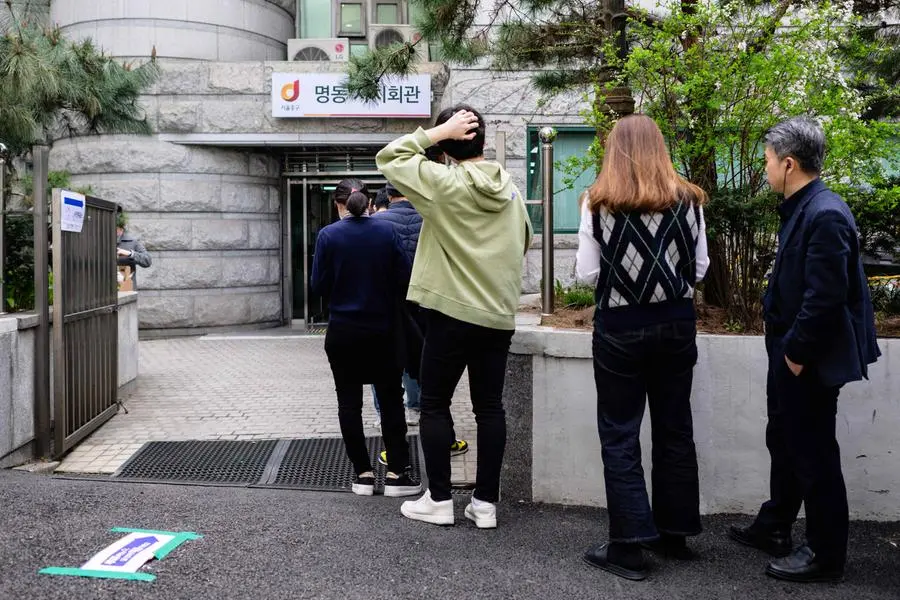PHOTO
South Korea will vote Wednesday in key legislative elections that will determine control of the country's parliament -- and whether President Yoon Suk Yeol can advance his socially conservative agenda.
The April 10 election, in which voters will choose members of the 300-seat National Assembly, is widely seen as a referendum on Yoon, who won a 2022 election by the narrowest margin in South Korean history.
His People Power Party (PPP) is hoping to win back control of parliament -- held by the opposition since 2016 -- which would be a boost for his agenda, including planned healthcare reforms, a hawkish North Korea policy, and a pledge to abolish the ministry of gender equality.
But if the opposition win big -- as some polls suggest they could -- experts say the president, who has long struggled with low popularity ratings, could effectively become a lame duck for the remainder of a term that ends in 2027.
"If the People Power Party is still a minority party after the general election... cooperation with the National Assembly will be very difficult," said Kang Joo-hyun, a professor of political science and international relations at Sookmyung Women's University.
"The president will become a lame duck quickly and... the power of state affairs will be greatly reduced," she told AFP.
Thanks to the election coming nearly halfway through his term, it "can perform the function of evaluating and judging the Yoon Suk Yeol administration's state administration," she said.
But it is equally "an election that can judge the opposition party", she added.
- Negative campaign -
The main opposition Democratic Party (DP), led by Yoon's arch-rival Lee Jae-myung, was polling slightly ahead of the PPP -- 37 percent to 35 percent -- in a March 31 Gallup survey.
Polling is banned for seven days before the vote.
But the newly formed Rebuilding Korea party has also been polling strongly as a protest vote, indicating that many voters feel both the government and opposition are lacking.
It is led by disgraced former justice minister Cho Kuk, who is facing jail time for allegedly forging documents to help his children gain admission to university.
Lee is also under investigation in a slew of cases, including for alleged bribery in connection with a firm that is suspected of illicitly transferring $8 million to North Korea. He denies all charges.
And the campaign has been more about stoking voter resentment than about substantive policy debate, experts say, with the PPP voting to "imprison" Lee and Cho, and the DP promising to "punish" Yoon for his purported misgovernance.
Major issues including Seoul's policy towards the nuclear-armed North have been nearly absent from campaign speeches, with even key voter concerns like inflation and an ongoing strike by junior doctors taking a back seat to a leadership popularity contest.
"Public sentiment that this election should be a stern referendum on Yoon has been strengthened in recent weeks to a point that this election can solely be seen as a referendum vote," political consultant Bae Kang-hun told AFP.
- 'Dead duck' -
Polls have even indicated the opposition could win a super-majority of more than 200 seats, which would give them the ability to move to impeach the president.
"If that were to happen, Yoon will be a dead duck, not only a lame duck," Bae said.
"There's virtually nothing he could do with such a lopsided parliament," he said, except "keep the status quo" on foreign policy, where he has sought to bury the historical hatchet with former colonial power Japan and forge closer ties with Washington to counter the North.
If Yoon becomes a lame duck, US President Joe Biden's administration could be "concerned about policy continuity," Claudia Junghyun Kim, an international affairs professor at City University of Hong Kong, told AFP.
"Yoon has unambiguously and unabashedly sided with the United States and its allies," she said.
"But then, if we end up with a second (Donald) Trump presidency, there's a question of policy continuity in Washington, too," she said, referring to the November election in the United States.





















